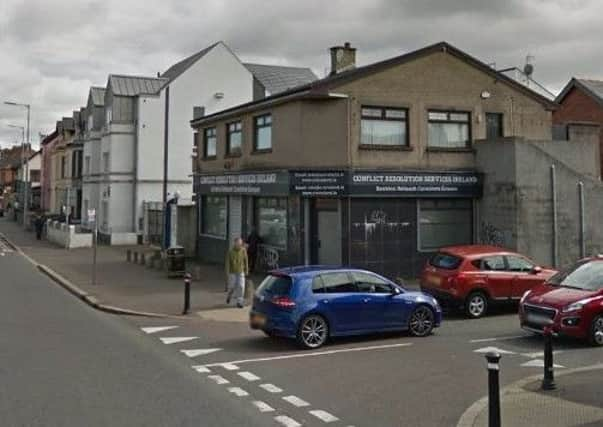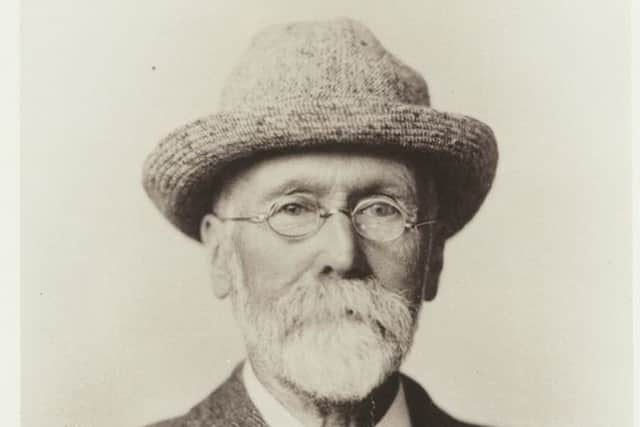Charity refuses to rule out funding group with alleged dissident republican ties


The group in question is called Conflict Resolution Services (Ireland) – or CRSI for short.
It is a registered charity which works with “anti-peace process republicans” and describes its mission as to “promote conflict resolution and reconciliation, mediation, and peace building”.
Advertisement
Hide AdAdvertisement
Hide AdIts premises have previously been raided by police (with two properties having been searched at the same time in 2015, and one in June this year), and fresh light has recently been shone on its activities as a result of an article in The Times of London.


The focus of The Times’ article in late August was that the Joseph Rowntree Charitable Trust (JRCT) – connected to the Quakers, a strictly non-violent religious movement – had given almost £400,000 to the group.
In the wake of that piece, the News Letter has looked deeper into the work and finances of the charity.
Among the things to have emerged is that the Rowntree charitable trust has not ruled out giving a planned £120,000 grant to the charity this year.
Advertisement
Hide AdAdvertisement
Hide AdThat is despite reports that a man currently waiting trial for allegedly commanding a terror group had been employed by CRSI, and that a current employee was sent to prison in 2012 over an incident described as a “botched punishment shooting”.
The JRCT defended its decision to fund the group, saying: “Our demilitarisation funding is only for those organisations which are committed to tackling the legacy of conflict-related violence and are seeking ways to bring about positive change in their communities.”
It also said “our Northern Ireland grant committee includes experts from different sections of the community” – though it refused to say who these people are when asked.
The trust began giving increasing sums to CRSI on a bi-annual basis from 2012 onward – starting with £57,000, then £90,920, then £120,200, and now a grant of £120,621.
Advertisement
Hide AdAdvertisement
Hide AdThis most recent grant was due to begin filtering through to CRSI this year, but no money has yet been handed over.
Asked if it still intends to provide the cash, the trust responded that “we will not be making any further statement”.
JRCT was asked why it is not responding, given the gravity of the issues at hand, but did not respond to that question.
The Charity Commission said it began an enquiry into CRSI in April 2017.
Advertisement
Hide AdAdvertisement
Hide Ad“The commission cannot provide any further comment on an open enquiry as to do so may prejudice the commission’s investigation, and any current or potential investigation of the PSNI,” it said.
However, Frances McCandless, its chief executive, said: “While we cannot comment on an open enquiry, we can make it clear that a charity’s trustees must act in the best interests of the charity and only within the purposes of the charity, regardless of any external affiliations.
“Charity trustees are also responsible for the reputation of the charity and should not act in a way which may bring the charity into disrepute.
“As our Serious Incident Reporting guidance highlights, where someone within or connected to the charity is found to have business with or links to terrorist groups, the commission expect this to be reported to us and the PSNI immediately, including how the issue is being managed.”
Advertisement
Hide AdAdvertisement
Hide AdThe commission added: “In addition to the onus on charity trustees to report serious incidents to the Commission, the list of matters considered reportable by the charity’s auditor or independent examiner include:
“4. Support of terrorism: matters leading to the knowledge or suspicion that the charity, its trustees, employees or assets, have been involved in or used to support terrorism or proscribed organisations in the UK or outside of the UK, with the exception of matters related to a qualifying offence as defined by Section 3(7) of the Northern Ireland (Sentences) Act 1998.”
The PSNI was asked if it was investigating CRSI.
It told the News Letter: “Detectives from Serious Crime Branch conducting an ongoing investigation into dissident republican terrorist activity have been in contact with the Charity Commission.
“Should any criminal offences be identified, police will take appropriate action.”
The News Letter attempted to contact CRSI over two days.
Advertisement
Hide AdAdvertisement
Hide AdTwo of its current directors were reached: Jeff Maxwell (whose address was given in directors’ paperwork as being the charity’s offices on the Falls Road) and Gerry Ruddy (whose address is in the Holylands area of south Belfast).
Mr Maxwell said he could not speak, and referred the News Letter to Mr Ruddy (as did an employee of CRSI, Sean O’Reilly).
Mr Ruddy in turn said, when contacted by phone: “Right, I’ve no comment on anything you’re going to ask me, ok?
“No comment... If you contact our funders, they’re dealing with it, the Rowntree trust. Ok?”
The line then went dead.
Advertisement
Hide AdAdvertisement
Hide AdCRSI’s accounts for 2014/2015 say it works with people who “may be at risk of punishments outside the criminal justice system”, mainly in north and west Belfast.
It seeks to “resolve and remove threat”, and succeeded in securing a “non-violent outcome” about 90% of the time, the accounts said.
Its accounts for 2016/17 give a flavour of other work, too.
“Approximately 50 ex-prisoners use our offices on a regular basis for political / social discussions,” it states.
“We are finding that this is facilitating debate amongst ‘anti-peace process republicans’ that they ordinarily mightn’t get the chance to avail of.”
Advertisement
Hide AdAdvertisement
Hide AdIt also says that “we undertook a number of residentials with ‘community activists’ to explore the current narratives that support the continuation of the ‘armed struggle’”.
It adds that it also “explored alternatives” to those violent narratives, and “whether these would be reflective of republicans within their respective communities”.
SPOTLIGHT ON ORGANISATION’S FIGURES:
Among CRSI’s dissident ties are that leading republican figure Carl Reilly had worked for it until 2015, according to reports including The Times.
At the time, Mr Reilly was chairman of dissident organisation the Republican Network for Unity.
Advertisement
Hide AdAdvertisement
Hide AdMr Reilly, 42 and of Pollard Close in west Belfast, is currently facing trial accused of directing terrorism and membership of a proscribed organisation between January 2014 and October 2015 – charges which he denies.
A court had been told he was allegedly recorded talking about bombings and shootings, and referred to himself as “the most f****** wanted man in Oglaigh na hEireann in the north”.
He recently appeared in court where a judge varied his bail conditions, allowing him to go on holiday to Benidorm on the Costa Del Sol this month.
He reportedly stopped being employed by CRSI following his arrest.
Advertisement
Hide AdAdvertisement
Hide AdHowever, Sean O’Reilly – who pleaded guilty to a firearms possession charge under the Firearms (NI) Order 2004 –still works for CRSI.
Mr O’Reilly, 42, and whose address was withheld by the courts, was jailed for 30 months in 2012 in relation to what one media report at the time called “a botched punishment shooting”.
He admitted attempted wounding with intent, and possession of a firearm or imitation firearm with intent to cause fear of violence.
A charge of firearm possession with intent was denied, and was left on the books.
Advertisement
Hide AdAdvertisement
Hide AdThe News Letter called CRSI’s offices and spoke to Sean O’Reilly.
He introduced himself as a staff member, but said he could not answer any questions.
The News Letter put the matter of the firearms and attempted wounding offences to him, adding that people may see it as contradictory for a charity which aims to help people under threat of extrajudicial attack to employ him, when he was involved in an extrajudicial attack.
“I won’t have any comment on that,” he said.
“As I said I mean you can ask those questions directly in relation to myself to the chairman of the board.”
Advertisement
Hide AdAdvertisement
Hide AdHe said this was CRSI director Gerry Ruddy. Mr Ruddy in turn declined to answer questions, and referred the News Letter to the Rowntree trust.
Mr Ruddy in turn is understood to be a former leader of the INLA’s political wing the IRSP (Irish Republican Socialist Party).
In an interview posted online in 2011 (which quotes him as referring to the “IRSP/INLA”) Mr Ruddy said he first joined the IRSP in 1981.
The following year, the INLA carried out its most infamous massacre, the Ballykelly bombing, leaving 11 soldiers and six civilians (five of whom were women) dead.
Mr Ruddy was quoted in the online interview saying he joined the IRSP’s central committee in 1983, and was its political secretary from 1997 until about 2007.